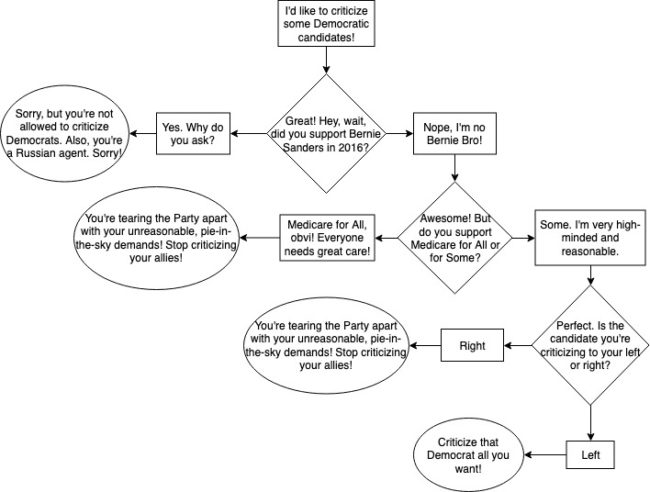Rife with disorganization and insecurity, the Democratic Party wants you to vote blue no matter who. I guess. I mean, they do sell the phrase on a t-shirt.
And it loves its metaphors. When you criticize fellow liberals, so they say, you’re just engaged in a circular firing squad. They really love that metaphor. You know, circular firing squad. They write about it over and over and over and over.
Not that they started recently. They were writing about it in 2016. Hell, even in 2006.
Probably in 1896, for all I know.
But there are real distinctions and divisions among liberals and leftists. And between liberals and leftists, as I wrote about previously in a quiz. The call to line up behind a candidate and a message is always louder when it comes from those who dominate the debate and the issues. That’s, of course, the fly in the ointment. Among others, which I’ll say more about below the flow chart.
Wait, what flow chart?
Oh, right. So that’s the point of this post.
Permissible Criticism According to the Democratic Party
For the confused, here’s what the Democratic Party seems to mean when it polices your criticism of the candidates.

The Premise
This is all for fun. Mostly, anyway. But when Democrats get nervous about criticism, the idea seems to be that party unity around a more moderate platform is conducive to winning elections. I’m not convinced by this.
Why? A couple of points.
One, we have a couple of recent examples of relatively contentious Democratic nomination processes. Those examples are 2008 and 2016. In 2008, upset supporters of Hillary Clinton formed a group called PUMA to protest the nomination of Barack Obama. In 2016, upset supporters of Bernie Sanders staged protests at the convention.
But these things didn’t harm the Democratic Party’s electoral prospects. Sure, some of the debate was acrimonious. But, in the end, the 2008 Clinton campaign and the 2016 Sanders campaign engaged a wider range of voters, raised interest in the eventual Democratic candidate, and provided a boost at the polls. Obama won in 2008 when he was the “left” primary candidate, and Clinton didn’t in 2016 when she was the “moderate” primary candidate. But the primaries didn’t harm either one. No matter what Clinton asserts in her book, or what others assert.
Two, it’s not contentious primaries that cause candidates to lose. It’s deeper causes that result in both losses and contentious primaries. Take the 1980 Democratic primaries as an example. People still love to blame Ted Kennedy for Jimmy Carter’s loss. But Kennedy didn’t cause it. There were already strong divisions in the Democratic Party, and those divisions led to Carter’s loss. It was those divisions that produced both Carter’s loss and Kennedy’s campaign. Carter still would’ve lost had Kennedy sat it out. Those divisions wouldn’t have just disappeared without a Kennedy run.
Criticize Well
Maybe it’s not a democratic country, but at least some of us wish it were. We have aspirations.
I don’t really care which candidates or policies you criticize. Just do it well. No bad arguments, fallacies, et al. And do it for a good purpose.